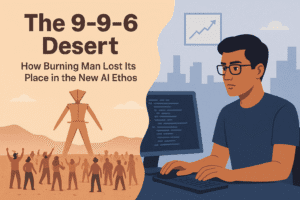The 9-9-6 Desert: How Burning Man Lost Its Place in the New AI Ethos
The cultural pendulum in tech is swinging dramatically, as exemplified by Indian-origin CEO Daksh Gupta’s critique of Burning Man. He positions the festival as an outdated relic, contrasting its free-form ethos with a new, dominant tech culture of hyper-optimization. This emerging ethos champions a disciplined, ascetic lifestyle marked by a “9-9-6” work schedule, teetotalism, and rigorous fitness regimes. Gupta’s comments reveal a generational shift where value is placed on measurable output and personal efficiency over experimental creativity.
The strong online reaction underscores a societal debate on the sustainability of such a high-pressure, balance-starved lifestyle. Ultimately, this isn’t about a festival’s relevance but a clash between two visions of progress: one born from communal creativity and the other from relentless, individual execution. The future of innovation may hinge on finding a synthesis between these two competing ideals.

The 9-9-6 Desert: How Burning Man Lost Its Place in the New AI Ethos
In the vast, dusty playa of Nevada’s Black Rock Desert, a cultural institution has thrived for decades. Burning Man, born from a spirit of radical self-expression, communal effort, and counter-cultural rebellion, has long been a pilgrimage for free-thinking artists, tech pioneers, and seekers of transformation. But from the sleek, monitor-lit offices of San Francisco’s AI startups, a new generation is looking at the event and seeing not the future, but a relic of the past.
This perspective was crystallized recently by Daksh Gupta, the 23-year-old Indian-origin CEO of AI startup Greptile. In an interview, he didn’t just question the festival; he declared a broader cultural schism. For him and his peers, the “current vibe” isn’t about desert parties or psychedelic exploration. It’s a disciplined, almost ascetic regimen: “no drinking, no drugs, 9-9-6 [work from 9 am to 9 pm, six days a week], lift heavy, run far, marry early, track sleep, eat steak and eggs.”
His comments, which quickly went viral, are about more than one person’s opinion. They are a window into a profound shift in tech culture, signaling the rise of a new ethos that values optimization not just in code, but in the human body and life itself.
From “Turn On, Tune In, Drop Out” to “Track, Optimize, Output”
Burning Man’s original principles—decommodification, radical self-reliance, and immediacy—once resonated deeply with Silicon Valley’s early disruptors. It was a place to break free from corporate structure, to connect and ideate without boundaries.
The new AI work ethic, as described by Gupta, flips this on its head. The goal is no longer to escape structure but to impose a hyper-efficient, personal structure on every facet of existence. The body is a system to be optimized with heavy lifting and steak-and-egg diets. The mind is a tool to be sharpened with pristine sleep tracking. Even life milestones like marriage are approached with the efficiency of a strategic plan (“marry early”).
This isn’t just hard work; it’s a total-life system. The “9-9-6” schedule is a badge of honor, a sign of commitment to the “rocket launch” pace of the AI boom. In this worldview, a week in the desert without reliable Wi-Fi isn’t a liberation; it’s a monumental inefficiency.
The Online Reaction: Inspiration, Skepticism, and a Search for Balance
The public reaction to Gupta’s comments was a perfect microcosm of the debate itself.
- The Believers: Many applauded the work ethic and discipline, seeing it as a necessary driver of monumental technological change.
- The Skeptics: Others questioned the human cost. One viral response hit a nerve: “Where are these people working from 9am-9pm six days a week finding someone to ‘marry early’?” This highlights the central tension: can this intense focus on professional output truly coexist with a rich, balanced personal life?
- The Practical Critics: Some comments shifted from philosophy to practice, with one user noting Gupta’s own hiring process involves a “10-15h take-home right after the screening call,” questioning if the ethos itself is sustainable for building long-term teams.
The Bigger Picture: Two Competing Visions of a Better Future
This isn’t really about whether Burning Man is “cool” anymore. It’s about two competing visions of progress and personal fulfillment.
- The Burning Man Model: Progress is born from creativity, collaboration, and challenging social norms. It is messy, human-centric, and often non-linear. The path to innovation is through experience and connection.
- The “9-9-6” Model: Progress is born from relentless execution, data-driven optimization, and extreme focus. It is clean, metric-centric, and intensely linear. The path to innovation is through sheer output and computational power.
Daksh Gupta is less a critic of an art festival and more an avatar of this second model. His doubt about Burning Man’s relevance is a statement that for his generation of builders, the most radical transformation isn’t happening in the desert—it’s happening in the codebase, the gym, and the sleep app.
The ultimate question for the tech industry, and perhaps for all of us navigating a world shaped by AI, is which model will win out. Or is there a vital, yet-to-be-discovered middle ground—a way to harness the power of relentless focus without sacrificing the human creativity that truly revolutionary ideas are made of? The conversation has moved beyond the playa; it’s now about the very blueprint for the future we are building.
You must be logged in to post a comment.